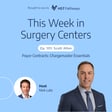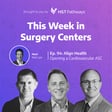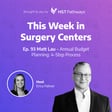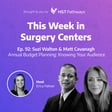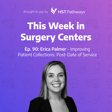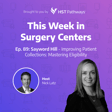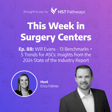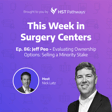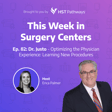Become a Creator today!Start creating today - Share your story with the world!
Start for free
00:00:00
00:00:01

Highlight Reel – What is one thing you can do this week to improve your surgery center?
At the end of every podcast episode, we always ask our guests, “What is one thing our listeners can do this week to improve their surgery centers?”
We took eleven of the most recent answers and turned them into this week’s recap episode. The advice they share covers everything from sterilization to board communication, staff appreciation, patient satisfaction survey results, block time, benchmarking, and so much more.
We hope everyone enjoys this round-up, and a huge thank you to our featured guests, in order of appearance:
- Monica Daniel
- Benita Tapia
- Kate Perlstrom
- Tina Piotrowski
- Alex Yampolsky
- Alex Taira
- Janet Carlson
- Amy Ishmael
- Kristen Richards
- Kristin Truesdell
- Dr. Joseph Puma
Brought to you by HST Pathways.
Transcript
Introduction to This Week in Surgery Centers
00:00:01
Speaker
Welcome to This Week in Surgery Centers. If you're in the ASC industry, then you're in the right place. Every week, we'll start the episode off by sharing an interesting conversation we had with our featured guests, and then we'll close the episode by recapping the latest news impacting surgery centers. We're excited to share with you what we have, so let's get started and see what the industry's been up to.
Highlights from Recent Guests
00:00:27
Speaker
Hi, everyone. Here's what you can expect on today's episode. Today is one of my favorite episodes that we put together. There will be no guest interview and no news, but instead a highlight reel of all the great advice our most recent guests have shared. Over the last three months we have had so many amazing as leaders on our podcast and at the end of every discussion we always ask them what is one thing our listeners can do this week to improve their surgery centers so we took eleven of the most recent answers and wrap them all up and turn them into this week's recap episode.
00:01:04
Speaker
The advice that our guests share covers everything from sterilization to board communication, staff appreciation, patient satisfaction survey results, block time benchmarking, and so much more. So without further ado, I hope everyone enjoys the episode and here's what's going on this week in Surgery Centers.
Why is Sterilization Crucial?
00:01:29
Speaker
Sure. I would say probably in in light of the fact that I think I just finished four surgery surveys in the last week, sterilization is such a huge hit area. I think that any administrator or manager would do themselves some good by digging into their sterile processing area, looking at maybe any gaps that they may have, and pulling every possible instruction for use or manufacturer guideline that they have for any product, any instrument, any piece of equipment to make sure that they're following by cleaning practices or just even operational practices based on those particular items. Because it's something that every surveyor right now is digging into really hard.
How to Leverage Patient Satisfaction Surveys?
00:02:12
Speaker
I'm a big advocate, a patient advocate, and we are there for our patients. And if I would give you one piece of advice, read those patient satisfaction surveys. Your patients will get tell you where the problems are and often like your own staff will be able to tell you or the patients how to fix it. Again, I will say it is always a team. We are, we're not successful without the team behind us. Empower your team. I guess that was one, one answer to that, right? i I love it. I said one, one final question, but I want to ask you just one follow up to that because the patient satisfaction survey is a great info. how How do you disseminate those results across your team? Okay. Wonderful. Great question. and We have a huddle, which is on every Monday morning at 7 30 every morning.
00:03:09
Speaker
All of the staff, any staff can call in, they don't have to be onsite, they can call into that huddle. Every Monday morning, we view those patient satisfaction surveys, okay? It also goes out to the staff, so if they couldn't be there, they will see on their huddle those patient satisfaction surveys. And as I told you, I have four centers. I
Improving Patient Experience Through Staff Interaction
00:03:34
Speaker
meet with each center once a week, and each week this comes up, We will say, how do you think that we can fix that? And that will be a team. And they're the ones that usually give the the answer, how they can do this. There was times where, you know, this is just one example, but the patients were like, the nurses were all at the nurses stations, right? The patients were all just waiting to go into surgery. Those patients have nothing to do but listen to everything that is going on. They have nothing else to do. They're waiting, they're anxious and everything. So now we have, one, the documentation. If they're charted, they'll chart by the bedside. So they're actually with the patient. But we also have it that they round. The staff round in the waiting room. They round the patients. And it's actually on a big board behind the nurses station that they actually sign off
00:04:30
Speaker
that they have rounded. So they've checked on every patient and made sure that they're okay. I have seen this on your podcast and there's a couple of times that I've been like, I agree with so many of what they've said because that's hard to pick one thing. But I think with regards to this topic, reading appendix L from CMS, appendix L, that is just your conditions of coverage for the governing body and management. And it will cover everything you need to know to make sure that you are running your board meetings effectively, have the agenda items that you need, and we'll be um setting you up for success in the future.
00:05:04
Speaker
There's certainly a lot, but really, I think what I wanted to say is just to be intentional in thanking your staff and physicians at every opportunity. As an administrator, there's so much for us to be thankful for with the work that every team member does every day to keep our centers running. We certainly cannot do it without our staff and without our physicians and I think that it just can go a long way to make sure that you are thanking people every day when you're out and about in your center and thanking physicians for being there and bringing cases and thanking the staff for everything that they do to keep the center running on any given day. So that would be my advice.
00:05:48
Speaker
So I'm going to do two. I'm going to say look into technology, of course, but
Involvement with ASCA: What's the Benefit?
00:05:52
Speaker
secondly, do these mock investigations and see where you have areas where you have a hard time pinpointing who the offender is. And those are the areas you should focus in on having extra oversight in. Yeah, I guess I think I have to go fully shameless here and just say get involved with ASCA. And there's a lot of ways you can do that. I think we just had a great in-person conference, our annual conference in Orlando just last month. And we're anticipating obviously another great conference next April to May and this in Denver. So we'll be looking forward to that. But there's a lot of other ways I know.
00:06:28
Speaker
David Opongwadi, our lead lobbyist at ASCO, would say you could donate to the PAC and that we're always fighting an uphill battle against other industries in terms of funding and legislative advocacy. Attached to that, you could participate in the fly-in. We had ah members come in February and meet with 161 congressional offices and advocate for policies that are favorable for ASCs. So I think there's a number of ways to get involved. And if you want to have more information on that, obviously please contact me or anyone you know at ASCA. Yeah. I'm going to butcher this number, but I think it was Bill at ASCA this year at the conference who shared that something like 75% of ASCs who did not pass accreditation were not members of ASCA. I think that was a grain of salt. It was some number very close to that, but I was really just impressed by the impact that you do have on your members.
00:07:23
Speaker
Yeah, and not to be alarmist or anything. but We might, we're going into an election cycle, so there's going to be a lot of potentially policies on the move.
Navigating Policy Changes in the ASC Industry
00:07:31
Speaker
We saw a lot of policies potentially changing in 2020 as the administration shifted, as the election year got going. So there's a lot to keep an eye on and stay involved. And I think we'll be trying our best to keep members and everyone in the community informed. that's A great question. I could spend here all day talking about it. One thing that I've been talking about recently to improve the overall culture and the patient outcomes of your surgery center is to really involve your team, especially your leadership team in the certification process for your facility and the ongoing continuous improvement and benchmarking. I think,
00:08:13
Speaker
It really gives everybody an appreciation for what it takes to run a surgery center, to be compliant, to be safe. And then to benchmark yourself against your peers and your colleagues. So I like to try to include as many people on the team in the process, so that when we do have a regulator, or excuse me, a regulatory person walk in the door, somebody there to survey us for whatever the reason is, we're prepared, people know where the information is to find it.
00:08:44
Speaker
and that they understand it's a collaborative process, it's not punitive. And so we're always striving for process improvement and continual improvement. So by including your team in this quality metrics, benchmarking, and being survey ready at all times will help have a more collaborative, warm environment, welcoming the surveyor to your facility. I think that's key so that people change their thinking about they're there to help us be the best surgery center we could possibly be to continue to have the routine, excellent, reproducible outpatient outcomes.
00:09:28
Speaker
What I would say is if you don't already do it,
Optimizing Surgery Center Operations
00:09:32
Speaker
start sending out a friendly communication to your providers and or their staff to confirm the schedule that you have for them. Make sure it's correct. That's the simple part. And remind them to release their unused block time three days prior to the day to service that can have a huge impact on your schedule pretty quick.
00:09:51
Speaker
I think you heard me talk about this a little bit and in my talk at ASCA but something that's really near and dear to my heart is making sure that we are measuring to manage performance and what I mean by that is that you're measuring quality performance of your center and you're doing it in a way that you can manage performance and that you're optimizing patient care. So if you're not capturing any quality metrics today for CV patient selection or any complications,
00:10:24
Speaker
put something
Harnessing Data for Improvement
00:10:25
Speaker
in place so that you start looking at that and paying attention to it. So again, that you're optimizing care in this setting and that you have a way to prove it in the future, right? So you could now have a negotiation with payers in the future because you're capturing data. That's what I would say. I would say it's about capturing data that is actionable. that helps you drive improved performance in your clinical, financial, and operational performance of your ASE. Probably a lot, but that's just how I feel strongly about it. Going back to the pair negotiations, with that, I would say you never get a better chance than your first contract. So make it a good one. Do your due diligence. If it takes you an extra two months to get that great contract, it's well worth it in the long run.
00:11:18
Speaker
And then lastly, as you, regardless of existing ASCE, OBL, conversion, or a de novo, organizations have to make sure that they have enough working capital to sustain some initial losses that organizations will see in the beginning months. So that's it. and Fantastic. I always listen to your podcast, so I had a feeling that question might be coming. And because of that, it was interesting. I didn't want to answer it on my own. I knew what my answer would be, but I went to my executive director a couple of days ago and I asked her. And and then I went to our chief operating officer and I asked him. And it was interesting what they said. Her answer was she would improve workflow.
00:12:05
Speaker
that there's always benefits, opportunities for workflow improvement for the patient. His answer was really interesting. He would get hospitality training for everyone that works in our ASC as well as in our other office because he thought there would be great benefit to even further differentiate yourself from the hospitals. My answer would be at the end of the day, we have plenty of data that demonstrates high volume practitioners and high volume centers deliver the best outcomes. And if you were planning
00:12:44
Speaker
to start
Growing Your Network of Physicians
00:12:45
Speaker
performing coronary procedures whenever that is. Since you're going to need some lead time for additional equipment or stuff, my answer would be start working on building your network right now of the physicians that would utilize your facility and expand it both on the horizontal and the vertical as quickly as you can because ultimately the best practitioners by volume and the best facilities by volume will make you a real star in your community. That is excellent advice and thank you for the the bonus advice from your team as well.
00:13:23
Speaker
yeah
